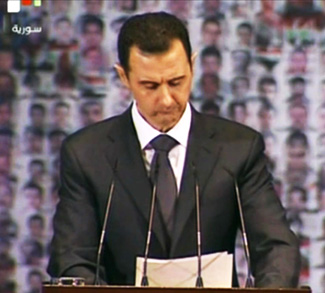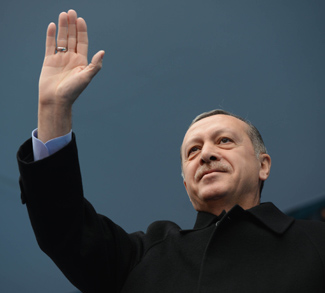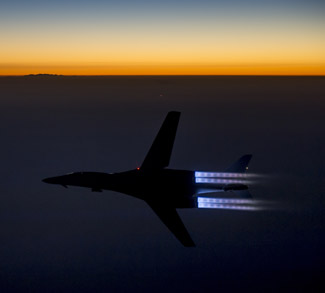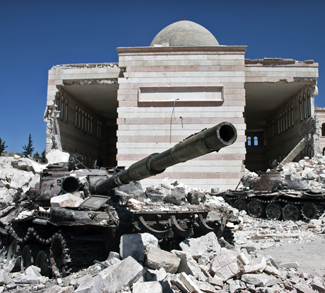Recent developments in the multilateral struggle against ISIS demonstrate a new consensus being reached between the subjective forces of regional players and their objective limitations. This consensus has been defined primarily by visions of the post-ISIS world.
It is not the fear of Islamic State nor the desire to eliminate it that defines the strategies of the main players in the Middle East. Rather it is the fear of how the balance of power will shift after ISIS is eliminated. And thus, the main question for major players is how to use ISIS in their favor and how to arrange the process of the group’s defeat and gain from it in the post-ISIS world.
ISIS is “allowed” to exist because of the current consensus, which has been partly agreed diplomatically “under the table” and partly accepted due to the objective military situation. At the same time, ISIS is not “allowed” to further expand into: Shia-dominated regions; regions controlled by the Kurdish forces; strategic oil fields and refineries; or Damascus and, later on, Syria’s major ports.
At this stage of the anti-ISIS campaign, the Gulf monarchies, Turkey, and Western powers are unlikely to interfere significantly if ISIS conquers Assad-controlled territory. All are trying to arrange the situation such that the main ISIS pressure is on the Assad regime. And they do so by making it really hard to expand in any other direction. In short, the consensus is to make ISIS move to the west and then, after Assad regime is doomed, start reducing ISIS-controlled territory from the north and from the east.
The only partial exclusion is the Sunni-dominated western areas in Iraq. Temporarily some such regions (like Ramadi) are “allowed” to be taken by ISIS. For the Gulf monarchies it serves the purpose to protect these areas from Shia domination until the post-ISIS world. For Iran it will be much easier to turn Iraq into a vassal if only the Shia parts remains in it. For the Shia-dominated Iraqi government it allows for the political and economic destruction of the Sunni aspect of Iraq’s future. Even if after the war the Sunni part of Iraq appears as a new state, an autonomous region, or a Saudi protectorate, the result will be a weak entity near the Shia-dominated main Iraqi territory.
From another side, advances of the Kurdish forces in Cizire and Kobane cantons are relatively slow now, but they are steady and robust. A slow but firm movement is logical at this stage, since none of ISIS’ enemies wants to start a significant offensive (such as the liberation of Mosul or Ramadi) and force ISIS to give its utmost military attention.
Given the current consensus, we can expect the following:
- ISIS will continue to focus on conquering Assad-controlled lands, thus increasing losses for the regime and its allies, including Iran-backed Hezbollah. A recent Hezbollah call to former rivals to join the “existential fight” with ISIS confirms the trend, since Hezbollah together with the Syrian Army feels increasing pressure from ISIS and foresees even harder times in the near future. Their manpower and morale is decreasing while Russia and Iran can supply only weapons, money, and advisors. Without replenishing local manpower, it will be tough for them to sustain the war effort.
- Rojavan forces (Kurds in northern Syria) will liberate the whole strip of land along the M4 highway from Kobane to the Cizire canton, as close to Ar-Raqqah as possible without incurring significant casualties for their forces. This bloc will act as an independent state. Even for Turkey, with its Northern Kurdistan problem, it is better to have a relatively stable and relatively dependent Kurdish state at its borders than the wildcard of ISIS-controlled land.
- The Kurdish part of Iraq will declare its independence, and sooner or later will unite with Rojava in Syria (Western Kurdistan).
- Having reached the Alawite (western seaside) part of Syria, ISIS’ “burn rate” and attrition will increase significantly due to fiercer fighting and increased occupation expenses on unfriendly territory.
- Any large offensive in Iraq will not start until ISIS forces are completely tied up in urban battles with the Assad regime, making it impossible for them to reinforce in other places.
- Except for small tactical gains, ISIS will not expand its territory to the north and to the east. It will be “forced” to move to the west and, after a certain point of attrition, will be pressed from the east in Iraq where it will lose Howija and Shirkat and then Mosul.
- These losses will be inevitable for ISIS after the Rojavan forces finalize their operations in northern and northeast Syria; Kurdish independence will be more or less accepted by the main regional players; and Iran will need to help the Assad regime and will encourage Shia militias in Iraq to launch an offensive against ISIS in Salahad Din and At Tamim provinces.
- It is unlikely that ISIS will be destroyed completely; it may be deprived of valuable territory and military potential, but it will remain a tool to be used by regional powers.
- Until the Assad regime negotiates peace with regional players or its military is destroyed, ISIS will exist.
- Even after Assad’s regime transforms or collapses, ISIS may survive for some time, mainly in the desert parts of Sunni Iraq and Syria until a new consensus is reached by regional powers about what to do with this territory – arrange autonomous regions in every country, divide and annex, or create a new state. And the fact that this post-ISIS consensus has not yet been found is the main obstacle to an efficient anti-ISIS campaign.
The biggest drawback of the current consensus is that it dooms people in Iraq and Syria to incredibly high casualties and prolonged starvation and suffering. The purpose of this article is to bring attention to how the situation is really unfolding and to urge politicians to achieve a consensus as soon as possible.
The opinions, beliefs, and viewpoints expressed by the authors are theirs alone and don’t reflect any official position of Geopoliticalmonitor.com.




